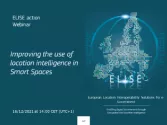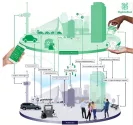
Background and scope
In recent years, the wide diffusion of technologies such as cloud computing, Internet of Things (IoT) and 4G/5G has enabled many cities to transform into hubs of digital transformation, deploying urban platforms, digital twins of cities and other digital ecosystems leveraging geospatial information. These trends are raising the challenge of digital transformation in the European Union, requiring an adaptation of its organisational structures, service models, policy frameworks and governance systems.
In this context, a trend with a strong element of location is the Smart Space, which includes smart cities, smart buildings, and many more. A Smart Space can be defined as a combination of physical and digital environments in which people and technology-enabled systems interact in dynamic, inter-connected and intelligent ecosystems [*].
Geospatial data and technology will have a key role to play in the implementation of a series of cloud-hosted European data spaces planned as part of the European data strategy, in particular – but not only – to support the Green Deal data space and its accompanying Destination Earth digital twin of the earth.
Access to and re-use of public and publicly funded data and private data constitute major cornerstones of a common European data space. Access to and contribution of data will be done – in some cases - through the implementation of Smart Spaces.
While we witness strong investments and the market for Smart Spaces expanding, we lack a deeper understanding of its challenges and the possible solutions that location intelligence might provide.
Within the context of the ELISE action of the ISA2 programme, we see a particular opportunity to identify areas where the public sector can help address these challenges - in support of the deployment of the European Data Strategy. Developing a framework to analyse Smart Spaces in this context is particularly relevant to identify barriers, such as interoperability of (location) data and technology, anticipating emerging market demands, and the derived recommendations for improving the status quo – especially for required actions of the public sector.
Notably, any such framework would have to be applicable at the generic level of Smart Spaces, i.e. to a large degree, independent of the nature of the particular kind of Smart Space (smart city, smart village, smart building, etc.).
Outcomes of the research
The research aims to develop and apply through case studies a benchmarking approach for Smart Spaces that identifies the challenges of a given smart space in relation to ELISE outcomes, best practices, and research on the use of location data and technologies.
The focus is on analysing the role of the public sector in relation to location intelligence, the application of AI, and location data and technology within these Smart Spaces.
The outcomes of the study will be collected in a Benchmarking Report, which includes:
- The development of the Draft Smart Space Benchmarking Framework applied to two case studies to benchmark the Evolving Role of Location Intelligence in Smart Spaces.
- The description of the Final Smart Space Benchmarking Framework applied to two additional case studies.
- The analysis of the role of the Public Sector concerning Location Intelligence in Smart Spaces derived from previous case studies and further study on public policy options.
Download the report and watch the dedicated webinar where the findings of the research were presented.
[*] source: Gartner




